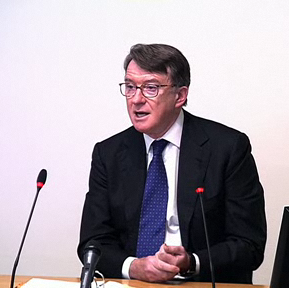Met Police statement: "Rebekah Brooks, 43, unemployed of Churchill, Oxfordshire, was
charged with 3 counts of conspiracy to pervert the course of justice".
Rebekah Brooks: "Whilst I have always respected the criminal justice system, I have
to question today whether the decision was made on a proper impartial
assessment of the evidence. I understand and know that there
needs to be a proper and thorough investigation, and I am baffled by the
decision to charge me. More importantly, however, I cannot express my
anger enough that those closest to me have been dragged into this
unfairly. One day the details of this case will emerge and people
will see today as an expensive sideshow, and a waste of public money as
a result of an unjust and weak decision."
Kelvin MacKenzie on Question Time: "Blair arse-licked the Murdoch press. Cameron saw that and said 'we should do the same.' Then the music stopped."
Peter Oborne at Leveson: "For all its blissful parish magazine quality the regional press does
not play a serious role in addressing Poulson-style scandals which go on
to this day."
Sir Harold Evans at Leveson: "We have a situation where newspapers employ private detectives. We used to employ reporters".
Charles Moore in the Daily Telegraph: "With the rise of the managerialist comes a special language – a weird
combination of semi-spiritual banality (“unlocking energies”), euphemism,
and legalese. If you want to see the difference between people steeped in
their trade and people steeped in managerialism, compare the testimony, at
the Leveson Inquiry, of the Murdochs, father and son. The wicked old man
spoke in the language, simultaneously sharp and blunt, of people who know
and run their business. The evasive son adopted the locutions taught in
business-school courses, honed by big law firms, footnoted by anxious
compliance officers."
More Charles Moore on the managerialists: "In such cultures, just as the experts, the professionals and the technicians
bitterly resent the managerialists for neither understanding nor caring, so
the managerialists secretly detest the professionals who, they believe, get
in the way of their rationalisations. They are desperate to 'let go' of such
people. Very unhappy organisations result."
AAGill in the Sunday Times: "Television’s way of
exploring issues is always more about the desire for lively television than
illuminating arguments. The cast list of pugilists, hacks and thwarted
politicians who will turn up at any studio, anywhere, in the early evening
has become the constitutional version of Mexican wrestling: shouty and
phoney. Question Time, in particular, needs to be seriously reimagined. None
of this is about involving the viewers in political debate or thought. It’s
thuggish and dispiriting and adds to the general disgust with the whole
political caste."
Sir Trevor McDonald in the Observer: "The bong for the News at Ten is no longer a national call to arms. People are tweeting and texting and surfing the web, so you can't rely on their attention."
Jeremy Clarkson in the Sunday Times: "If I make a mistake, can Ofcom take
away my children? Fine me? Put me in prison? No. Time and again I read in
the
Daily Mail that I’ve had my “knuckles rapped” for “sparking” some kind
of fury. But the truth is, nothing of the sort ever happens. I don’t even
get a call from the headmaster."
Dominic Sandbrook reviewing a new book on W.T. Stead ( Muckraker by W. Sydney Robinson) in the Sunday Times: "What would Lord Justice Leveson have made of William Thomas Stead? The most
influential journalist of the Victorian age, a man of boundless energy and
conviction, Stead broke almost every rule imaginable. An inveterate flirt
who was often caught kissing visitors in the editor’s office, he spent
decades campaigning against sexual immorality. He twisted the truth,
invented quotations and doctored pictures. He travelled to St Petersburg to
interview the tsar, tried to get the Pope to relocate to London, campaigned
for the Boers against the British and even claimed to be in touch with
Winston Churchill’s dead father. Most infamously, he bought a teenage girl
from her parents, installed her in a brothel and then arranged to take her
virginity — all, he said, in the name of the greater good. By comparison,
today’s journalists look positively saintly."









































